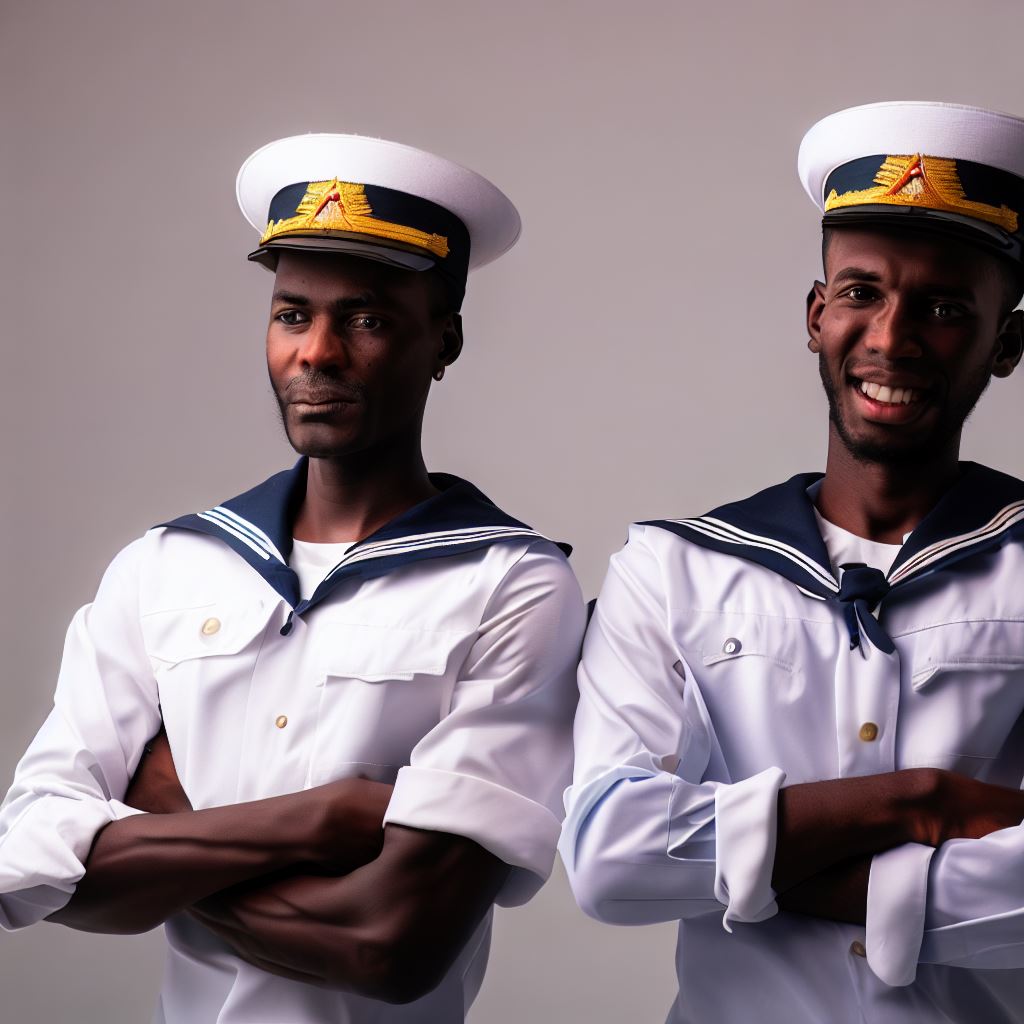Introduction
A sailor training program in Nigeria is an essential aspect of maritime development in the country.
These programs play a crucial role in producing highly skilled and competent sailors who contribute to the growth of Nigeria’s maritime industry.
This comprehensive guide aims to provide valuable insights into sailor training programs in Nigeria, highlighting their significance and benefits.
Importance of Sailor Training Programs in Nigeria
Sailor training programs in Nigeria are vital for several reasons. Firstly, they equip individuals with the necessary skills and knowledge required to excel in the maritime industry.
This training ensures that sailors possess the competence to navigate vessels, manage emergencies, and operate various maritime equipment.
Furthermore, sailor training programs contribute to the development of human capital in Nigeria.
By providing quality education and practical training, these programs empower individuals to pursue rewarding careers in the maritime sector.
This, in turn, promotes economic growth and job creation in the country.
Thesis Statement
This comprehensive guide will provide valuable insights into sailor training programs in Nigeria.
By exploring their structure, curriculum, and outcomes, readers will gain a thorough understanding of the benefits and significance of these programs in shaping Nigeria’s maritime industry.
In essence, sailor training programs in Nigeria are crucial for the growth and development of the country’s maritime sector.
This post will serve as a valuable resource for individuals seeking information on sailor training programs, offering a detailed analysis of their importance and impact on Nigeria’s maritime industry.
Overview of Sailor Training Programs
Definition and Purpose of Sailor Training Programs
Sailor training programs are comprehensive educational programs specifically designed to prepare individuals for a successful career in sailing.
These programs aim to provide students with the necessary skills, knowledge, and experience required to navigate and operate vessels effectively.
The purpose of sailor training programs is to equip aspiring sailors with the fundamental skills needed to handle various aspects of sailing, such as boat handling, navigation, safety procedures, and maritime regulations.
These programs also focus on building teamwork, leadership, and problem-solving abilities, as these qualities are essential for a successful career in sailing.
Different Types of Sailor Training Programs Available
There are several types of sailor training programs available to cater to different levels of experience and career goals. These programs include:
- Basic Training Programs: These programs are suitable for beginners with little to no experience in sailing.
They provide a solid foundation in sailing techniques, terminology, safety protocols, and basic navigation skills. - Advanced Training Programs: Advanced training programs are designed for individuals who already possess basic sailing knowledge and skills.
These programs aim to further enhance and refine their abilities, covering topics such as advanced navigation, weather forecasting, yacht maintenance, and racing strategies. - Specialized Training Programs: Specialized training programs focus on specific areas of sailing, such as offshore sailing, racing, cruising, or yacht chartering.
These programs provide in-depth training and specialized knowledge tailored to the particular field of interest.
Importance of Choosing the Right Training Program
Choosing the right training program is essential for aspiring sailors, as it significantly impacts their overall learning experience and future career opportunities.
Here’s why selecting the appropriate training program is of utmost importance:
- Quality Education: A reputable and well-structured training program ensures that students receive high-quality education and instruction from experienced professionals.
This lays the foundation for a successful sailing career. - Relevant Skills and Knowledge: Each training program offers a specific curriculum designed to equip sailors with relevant skills and knowledge necessary for their chosen career path.
Choosing the right program ensures that the skills acquired are aligned with one’s goals. - Industry Recognition: Certain training programs have gained industry recognition and accreditation, making graduates more desirable to potential employers.
It is crucial to choose a program that holds value in the sailing industry to enhance career prospects. - Networking Opportunities: Joining a recognized training program provides opportunities to network with industry professionals, fellow sailors, and potential employers.
Building connections within the sailing community can prove valuable in advancing one’s career. - Personal Growth: The right training program not only imparts technical skills but also focuses on personal development.
Programs that emphasize teamwork, leadership, and problem-solving skills can greatly contribute to personal growth and professional success.
In fact, sailor training programs are vital for individuals aspiring to pursue a career in sailing.
Understanding the definition, purpose, and types of training programs available is crucial in selecting the right program that aligns with personal goals and aspirations.
Investing in a comprehensive and reputable training program sets the foundation for a successful and fulfilling career in the world of sailing.
Read: Top 10 Companies Hiring Logistics Managers in Nigeria
Requirements and Eligibility
Age restrictions
To be eligible for the Sailor Training Program in Nigeria, there are certain age restrictions that applicants must meet.
The minimum age requirement is 17 years old, while the maximum age limit is usually around 25 years old.
This age range ensures that candidates are young and have the physical stamina required for the training program.
Educational qualifications
Apart from age, the Sailor Training Program also has specific educational qualifications that applicants must fulfill.
The minimum educational requirement is a high school diploma or its equivalent.
This ensures that candidates have a basic level of education and are capable of understanding the necessary coursework and training materials.
Physical fitness requirements
Physical fitness is crucial for successful completion of the Sailor Training Program. Candidates must meet certain physical fitness requirements, including a certain level of strength, agility, and endurance.
This is assessed through physical fitness tests, which may include running, push-ups, sit-ups, and other exercises.
The purpose of these tests is to ensure that candidates are physically capable of handling the demands of the program.
Other eligibility criteria
In addition to age restrictions and educational qualifications, there may be other eligibility criteria that applicants need to meet.
These can include nationality requirements, such as being a citizen of Nigeria, or being a permanent resident.
Candidates may also be required to pass a medical examination to ensure that they are in good health and free from any conditions that may hinder their ability to complete the training program.
It is important for applicants to carefully review and understand all the eligibility criteria before applying for the Sailor Training Program.
Failing to meet any of the requirements can result in the rejection of the application. Therefore, it is essential to gather all the necessary documents and information to prove eligibility.
Once the eligibility criteria are met, candidates can move on to the application process, which typically includes submitting an application form, providing supporting documents, and possibly attending an interview.
The selection process for the Sailor Training Program is competitive, as there are usually limited spots available. Meeting the eligibility criteria is the first step towards securing a place in the program.
In summary, the Sailor Training Program in Nigeria has specific requirements and eligibility criteria that applicants must meet.
These include age restrictions, educational qualifications, physical fitness requirements, and other eligibility criteria.
It is crucial for applicants to carefully review and understand all the criteria before applying to increase their chances of being accepted into the program.
Meeting these requirements is the first step towards embarking on a career in the Nigerian Navy.
Read: COVID-19 Impact on Logistics Management in Nigeria
Popular Sailor Training Institutes in Nigeria
In this section, we will explore some of the most popular sailor training institutes in Nigeria.
African Maritime Academy: Background, facilities, and courses offered
African Maritime Academy is one of the leading sailor training institutes in Nigeria.
Established in 1990, it has a rich history and a strong reputation in the industry.
The institute is equipped with state-of-the-art facilities, including modern classrooms and simulation equipment.
They offer a wide range of courses, including Basic Seamanship, Navigation, and Marine Engineering.
With highly qualified instructors and practical training sessions, students receive hands-on experience.
Upon completion, graduates receive internationally recognized certifications, making them eligible for employment worldwide.
This institute has a strong network of partnerships with shipping companies and maritime organizations, providing students with job placement opportunities.
All Nations Institute of Marine and Technology: Background, facilities, and courses offered
All Nations Institute of Marine and Technology is another top sailor training institute in Nigeria.
Founded in 2005, it has quickly gained recognition for its high-quality training programs.
The institute boasts modern facilities, including well-equipped classrooms and advanced simulators.
Their courses cover a variety of subjects, such as Ship Stability, Cargo Handling, and Firefighting.
Experienced faculty members ensure that students grasp theoretical knowledge and practical skills.
Upon graduation, students are awarded internationally recognized certifications, enhancing their job prospects.
This institute also offers career counseling services, helping students navigate the job market and secure employment.
Certified Institute of Shipping of Nigeria: Background, facilities, and courses offered
Certified Institute of Shipping of Nigeria is renowned for its comprehensive sailor training programs.
Established in 1995, it has successfully trained numerous sailors who are now working in the industry.
The institute is equipped with state-of-the-art facilities, including modern classrooms and simulators.
Their course offerings include Maritime Safety, Ship Management, and Marine Communications.
Highly experienced instructors guide students through theoretical concepts and practical exercises.
Upon completion, students receive recognized certifications, enabling them to pursue lucrative career opportunities.
Certified Institute of Shipping of Nigeria encourages students to participate in internships and apprenticeships to gain real-world experience.
The institute also organizes job fairs and recruitment events, connecting graduates with potential employers.
These popular sailor training institutes in Nigeria provide aspiring sailors with top-notch education and practical skills.
Whether you choose African Maritime Academy, All Nations Institute of Marine and Technology, or Certified Institute of Shipping of Nigeria, you can expect high-quality training, modern facilities, and career support.
Embark on your journey to becoming a professional sailor by enrolling in one of these renowned institutes.
Read: The Future of Logistics Management in Nigeria: A Forecast
Curriculum and Training Modules
Overview of the syllabus
- The curriculum for sailor training programs in Nigeria is designed to provide comprehensive knowledge and skills.
- It covers various aspects such as navigation, seamanship, ship maintenance, and cargo handling.
- The syllabus also includes subjects like marine engineering, marine electronics, and marine safety procedures.
- It aims to equip aspiring sailors with the necessary competencies to embark on a successful maritime career.
Practical training modules
- Practical training plays a crucial role in sailor training programs.
- Trainees undergo hands-on experience on actual ships to learn navigation techniques, rope work, and anchoring.
- They practice cargo handling, including loading and unloading procedures.
- Simulated exercises on lifeboat operations and fire-fighting drills are also conducted to enhance their skills.
Theoretical training modules
- Theoretical modules supplement the practical training by providing the necessary theoretical knowledge.
- Trainees are taught about maritime laws, navigation rules, and international regulations.
- They learn about meteorology, tides, and currents to ensure safe navigation at sea.
- Theoretical modules also cover ship stability, ship construction, and electrical systems on board.
Safety and emergency training
- Safety and emergency training is a crucial part of sailor training programs.
- Trainees are trained on safety procedures, including the use of personal protective equipment.
- They learn about ship evacuation, survival techniques, and basic first aid.
- Emergency situations like fire, flooding, and man overboard are simulated to develop their response skills.
In short, the curriculum for sailor training programs in Nigeria is carefully designed to provide a comprehensive education to aspiring sailors.
Both practical and theoretical training modules are included to ensure a well-rounded learning experience.
Safety and emergency training is prioritized to equip trainees with essential skills to handle unforeseen situations at sea.
Through these comprehensive training programs, Nigeria aims to build a skilled and competent workforce in the maritime industry.
Read: Sustainable Practices in Logistics Management in Nigeria

Certification and Accreditation
Importance of certification in sailor training programs
Obtaining certification in sailor training programs in Nigeria is crucial for aspiring sailors and maritime professionals.
Certification serves as a testament to the individuals’ competence and proficiency in their respective roles. It also plays a significant role in ensuring the overall quality and safety of the maritime industry.
Certification holds immense importance as it establishes a standardized framework for sailor training programs.
It sets clear guidelines and benchmarks for the institutions and trainers to follow, ensuring that the trainees receive comprehensive and industry-relevant knowledge and skills.
Recognized certification bodies in Nigeria
In addition to the emphasis on quality, certification enhances the employability of individuals in the maritime sector.
Employers often prioritize candidates with recognized certifications, as it serves as tangible evidence of their expertise.
It gives job seekers a competitive edge and increases their chances of securing desirable employment opportunities.
In Nigeria, several certification bodies play a crucial role in regulating and accrediting sailor training programs.
The Nigerian Maritime Administration and Safety Agency (NIMASA) is the primary regulatory authority responsible for ensuring compliance and standardization in the maritime industry.
The Nigerian Maritime Institute (NMI) is a recognized institution that offers comprehensive and approved certification programs for aspiring sailors.
NMI’s certifications are highly regarded and widely accepted by employers and industry professionals.
Furthermore, the Nigerian Navy is actively involved in providing certification for naval operations and related training programs.
Their certifications hold significant value and are well-respected within the maritime community.
Process of acquiring certification
The process of acquiring certification involves several steps. Aspiring sailors must first select an accredited training program from a recognized institution.
These programs cover various aspects of sailor training, including navigation, seamanship, and safety procedures.
Upon completing the necessary training modules and assessments, individuals need to submit their documents, including forms and certificates, to the respective certification body.
The certification body then evaluates the trainee’s performance and competency through practical assessments.
If the individual successfully meets the standards and requirements set by the certification body, they will be issued the appropriate certification for their designated sailor role.
It is essential to note that certifications need to be periodically renewed, often through re-assessments or fulfilling specific continuing education requirements.
In general, certification is integral to the sailor training programs in Nigeria.
It ensures standardization, validates competencies, and instills trust in the individuals, institutions, and the maritime industry as a whole.
Aspiring sailors should aim to acquire recognized certifications to enhance their career prospects and contribute to the growth and safety of the maritime sector.
Job Opportunities and Career Paths
Overview of job prospects for trained sailors in Nigeria
Trained sailors in Nigeria have a wide range of job opportunities available to them. With a growing maritime industry and Nigeria’s extensive coastline, there is a constant demand for skilled sailors.
- Maritime Industry: Trained sailors can find employment in various sectors of the maritime industry, including offshore drilling, shipping, and fishing.
- Merchant Navy: The Merchant Navy offers numerous job prospects for sailors, including working on cargo ships, passenger ships, and tankers.
- Naval Forces: Trained sailors can also pursue a career in the Nigerian Navy, serving the country in defense and security operations.
Overall, the job prospects for trained sailors in Nigeria are promising, with a steady demand for their skills in the maritime sector.
Different career paths available
Trained sailors in Nigeria have the opportunity to choose from various career paths in the maritime industry.
- Deck Department: Sailors can pursue a career in the deck department, which involves navigation, maneuvering the ship, and cargo handling.
- Engineering Department: Another career path is in the engineering department, focusing on the maintenance and operation of ship systems and machinery.
- Offshore Industry: Trained sailors can also work in the offshore industry, including oil and gas exploration and production platforms.
- Fishing Industry: Some sailors may opt for a career in the fishing industry, working on fishing vessels and participating in commercial fishing operations.
These are just a few examples of the diverse career paths available for trained sailors in Nigeria.
Potential earnings and benefits
Trained sailors in Nigeria can enjoy competitive earnings and a range of benefits.
- Salary: Sailors can expect a decent salary, with the potential for higher earnings based on experience, rank, and the type of vessel.
- Allowances: Many sailors also receive various allowances, such as food, accommodation, and transportation allowances.
- Career Progression: With experience and additional certifications, sailors have opportunities for career advancement and higher salaries.
- Job Security: The demand for sailors in Nigeria provides job security and stability in the maritime industry.
- Travel Opportunities: Sailors also benefit from the chance to travel to different countries and experience diverse cultures.
These potential earnings and benefits make a career in sailing an attractive choice for many individuals in Nigeria.
Challenges and Solutions
Common challenges faced during sailor training programs
- Limited financial resources for training materials and resources.
- Inadequate infrastructure and facilities for practical training.
- Lack of qualified instructors with extensive maritime experience.
- Inconsistent standardized training programs across different training schools.
- Language barriers for trainees from non-English speaking backgrounds.
Strategies to overcome challenges
Overcoming the challenges in sailor training programs is crucial to ensure the effectiveness and success of the training.
By addressing financial constraints, infrastructure deficiencies, and instructor qualifications, trainees can receive comprehensive and quality training.
Partnerships with international organizations can bring in necessary funds to support the training programs and provide trainees with up-to-date resources and materials.
Investing in infrastructure and facilities contributes to creating a practical learning environment, allowing trainees to gain hands-on experience and develop essential skills required in their future careers as sailors.
Recruiting experienced maritime professionals as trainers and mentors ensures trainees receive guidance and expertise from individuals who have extensive knowledge and experience in the industry.
Establishing a regulatory body to enforce standardized training programs can help eliminate inconsistencies among different training schools and ensure that all trainees receive an equal level of education and training.
Language barriers can hinder effective communication and comprehension during the training process.
Providing language classes and interpreters can assist trainees from non-English speaking backgrounds in understanding the course material and participating fully in the training programs.
Support systems in place for trainees
To support trainees throughout their training period, mentorship programs can provide guidance and encouragement from experienced sailors.
Counseling services can address any psychological challenges faced by trainees due to the rigorous nature of the training.
Access to medical facilities and healthcare services is essential for trainees’ well-being, ensuring their physical and mental health is taken care of during the training process.
Provision of accommodations and meals for trainees eliminates additional stressors and allows them to focus solely on their training without worrying about basic needs.
Continuous assessment and feedback mechanisms enable trainers to monitor trainees’ progress, identify any difficulties or areas needing improvement, and provide timely support and guidance accordingly.
By recognizing these common challenges and implementing effective strategies and support systems, sailor training programs in Nigeria can overcome obstacles and produce highly skilled and competent sailors ready to navigate the seas with confidence.
Delve into the Subject: Nigeria’s Industrial Truck Industry: An Overview
Success Stories and Testimonials
Success stories of individuals who completed sailor training programs
- Olivia, a young woman from Lagos, joined a sailor training program and secured a well-paying job in the maritime industry.
- David, a former fisherman, underwent sailor training and is now a chief engineer on a cargo ship, earning a handsome salary.
- Emeka, a Nigerian student with a passion for the sea, pursued sailor training and became a captain of a luxury cruise ship.
- Funke, a diligent individual from Port Harcourt, completed sailor training and now works as a navigation officer, enjoying a fulfilling career.
- John, a dedicated sailor trainee, overcame challenges and became a successful seafarer, traveling the world and gaining valuable experiences.
Importance of networking and building connections
Networking and building connections play a crucial role in the success of sailor trainees:
- Building a strong network of professionals in the maritime industry can provide valuable career opportunities and guidance.
- Networking allows sailor trainees to connect with experienced individuals who can share their knowledge and offer career advice.
- Through networking, trainees can learn about job openings, internships, and training programs in the maritime sector.
- Attending industry events and conferences provides opportunities to connect with potential employers and industry influencers.
- Networking helps establish credibility and visibility, increasing the chances of landing desirable positions within the maritime industry.
- Building connections enables sailors to stay informed about the latest industry trends, technological advancements, and career opportunities.
- Mentorship from well-established professionals can provide essential guidance and support throughout the sailor’s career journey.
- Networking facilitates the exchange of ideas and collaboration among sailors, leading to innovation and improvements in the industry.
- Through networking, sailors can develop long-lasting relationships that contribute to their personal and professional growth.
- Networking can also create a supportive community where sailors can share their experiences, challenges, and success stories.
Success stories and the importance of networking highlight the transformative impact of sailor training programs in Nigeria.
By showcasing real-life examples of individuals who have achieved success through these programs and emphasizing the value of building connections, aspiring sailors are inspired to embark on their own journeys and pursue fulfilling careers in the maritime industry.
Conclusion
Sailors play a vital role in the maritime industry, ensuring smooth operations and safety at sea.
If you have a passion for maritime careers, sailor training programs in Nigeria provide excellent opportunities for growth and advancement.
Remember to research and choose reputable training institutions, join professional organizations, and stay updated with the latest industry developments.
Sailor training programs in Nigeria are essential for building a skilled workforce in the maritime sector.
These programs offer a pathway to exciting and rewarding careers, with opportunities for personal and professional growth.
If you’re passionate about sailing, don’t hesitate to pursue training and take advantage of the resources available to you.
Fair winds and smooth sailing on your journey to becoming a successful sailor in Nigeria’s maritime industry!




